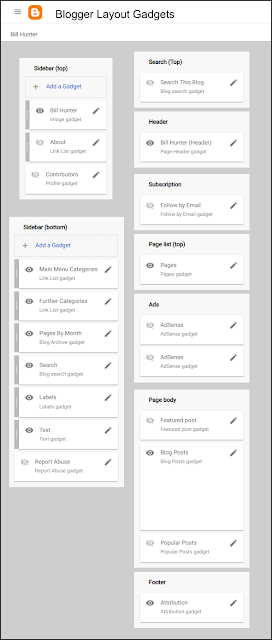Building Bill's Beard Blogspot with Blogger
Blogs are hosted by Google and accessed from a subdomain of blogspot.com. An example of course being this website's address of williamalberthunter.blogspot.com.
All that’s needed to set up a blog of your own is a Google account.
Blogs hosted by Google are easy to manage, relatively hassle-free and very secure.
Blogger is splendid not only for newcomers to blogging but also for users such as myself who intend to develop a basic personal blog and have decided there's no need for the bells and whistles which come with a more sophisticated Content Management System (CMS).
Having said that, over the years, I've made use of many open source CMS.
The choice is very much one of horses for courses.
In developing a web presence Wordpress has undoubtedly much to offer.
In the early days it was primarily intended for bloggers but has progressed to become the world's most popular website builder.
It boasts an enormous selection of themes and plugins. Plugins are add-ons that extend the capabilities of the website.
Here's a link to the now redundant website blackballinternational.org which I created for a major billiards event using Wordpress.
Drupal is another popular open source CMS.
It comes with an interface which at first glance may quite frankly appear incomprehensible. It is nevertheless an outstanding option if you have coding skills and intend to develop a highly customised site.
I've used Drupal only once. That was for a Scottish pool organisation's website. The downside was that site development proved outrageously time-consuming.
Each Content Management System has its pros and cons but all of course require web hosting.
Many aspiring bloggers may opt to purchase both hosting and a domain name from the outset.
That's not necessarily the best approach and it could pay to be cautious.
Unfortunately finding a reliable host can be a hit and miss affair. Get it wrong and the consequence may be an insecure website, lengthy down-times and indifferent support.
Another factor to consider is that Wordpress and other popular open source platforms are a constant target for hackers.
In my experience the majority of hacks are down to vulnerabilities in software coding. On a couple of occasions sustained attacks and the resultant damage have forced me to abandon websites.
My conclusion is that if your needs are modest and you are satisfied with a no frills blogging platform then there are few better alternatives than Google's Blogger.
You will avoid many of the issues outlined above and swiftly construct a fully functioning blog.
There are heaps of Blogger tutorials online to get you started, so I've just a few comments to add.
The Google Blogger dashboard is the starting point to administer all aspects of your blog and choosing a 'Theme' is likely to be one of your first steps.
There's an assortment of templates to help you create a blog which suits your style.
I chose 'Contempo Aqua'.
It is, as you'd expect these days, a responsive theme. That simply means the website layout adjusts smoothly depending upon the screen size and resolution of the device on which the blog is being viewed.
That's easily done. Just click the 'CUSTOMISE' button to discover what options are available.
I find that a colour scheme incorporating many different colours can look too busy.
Shades of a single colour can be effective.
Not everyone's cup of tea I'm sure but for this blog I opted to limit theme colours to a few shades of grey (other than the traditional hyperlink blue) to emphasise text and images.

There are primary areas such as the Page Body, Sidebars and Footer.
Google gadgets are applications embedded within your blog such as Blog Posts, Page Lists, Link Lists, Search boxes, Contact Forms and Adsense Ads.
Some may be moved within, or transferred between, sections.
Individual gadgets can be configured to a lesser or greater extent.
In this blog I've chosen to display the blog author, date of post, reader reactions and the share icon. There's also an option to comment on my posts.
Fortunately many features you'd perhaps wish to see incorporated into your blog have probably already been developed by other bloggers.
A Google search will direct you to snippets of code which can be copied and added to your blog with few or no modifications.
I did however want snippets of code to be presented neatly within my blog posts.
Adding CSS was an easy way to achieve this.
I settled for a blogspot.com subdomain name, but it's possible to register your own domain name through Google Domains.
This may make your web address more memorable and arguably improve search engine rankings.
Another possibility is to set up Adsense.
Adsense will automatically display targeted ads and perhaps generate a little income.
Of course you may not wish to feature ads which distract attention away from your blog content and direct readers to other websites.
Do you use Google Blogger?





Comments